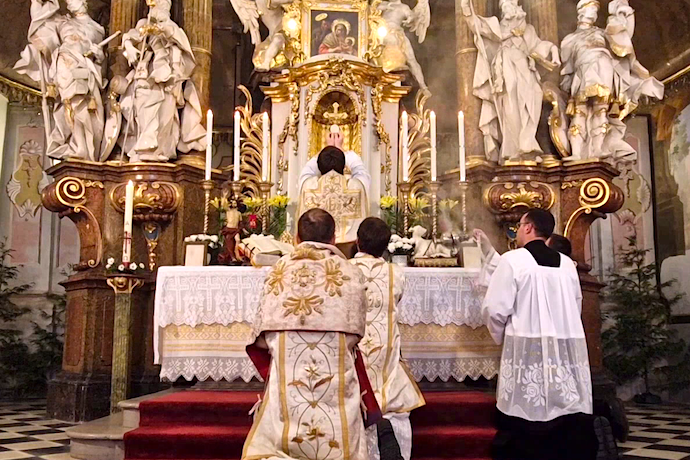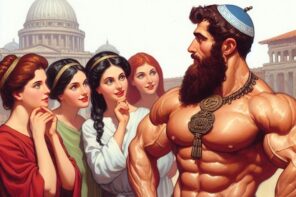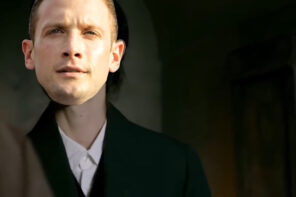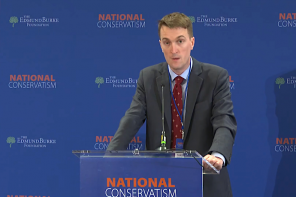Trads (or traditionalist Catholics) are having a moment. In the last four weeks alone, Kansas City Chiefs kicker Harrison Butker delivered a controversial commencement speech at a conservative Catholic college, right-wing media personality Candace Owens announced her conversion to Catholicism, and White supremacist and Catholic integralist Nick Fuentes returned to X (formerly Twitter) after having been banned for antisemitism. There are certainly differences between these three figures, both theological and political, so what can they tell us about the Catholic side of Christian nationalism?
While there’s been a flurry of media and scholarly attention to the evangelical base of Christian nationalism and to White evangelical racism more broadly, less attention has been paid to conservative (liturgically and/or politically) traditionalist Catholic communities. Trads are often defined as Catholics who prefer the liturgy and social teaching from before the Second Vatican Council (1962-1965) when the church “modernized.” As Peter Schwartz notes here on RD, Catholics certainly bring a lot of cultural resources to current articulations of national conservatism.
Take Butker’s speech at Benedictine College in Atchison, Kansas. It’s been lambasted by both the mainstream media as well as creators on social media for its misogyny and homophobia. Almost all of the media attention has focused on his comments about women, particularly the “diabolical lies” told to them about having career success when they should be most excited about “marriage and the children you will bring into this world.”
But most commentators have failed to contextualize his speech as a TradCath speaking to other TradCaths. Benedictine is a “Newman Guide” College, or a college approved by the Cardinal Newman Society, a trad organization that “promotes clear standards of Catholic identity.” Most US Catholic colleges don’t make the Newman Society’s list as they’re either too “woke” or simply too secularized (including Notre Dame and Villanova). Out of the 200 Catholic colleges in the US, only 20 or so receive this stamp of approval. In other words, Benedictine is part of the far-right and Traditionalist wing of US Catholicism, “a small number” of truly faithful even by their own admission.
And even at Benedictine, the speech didn’t escape criticism. Despite being a very trad college, many students reacted to both the declaration that women should primarily find meaning in being a wife and mother as well as the anti-LGBTQ statements made by Butker.
But Butker’s speech went well beyond misogyny and homophobia. It was a muscular, culture warrior, no-more-mister-nice-guy screed. He didn’t merely express a Christian or Catholic identity, but critiqued the practice of priests, bishops, and Joe Biden as not “really” Catholic (something the president and his supporters are evidently concerned about). He railed against “the tyranny of diversity, equity and inclusion” (aka DEI) and how it makes Catholics “keep our beliefs to ourselves” (though he didn’t clarify exactly how Catholic beliefs are diametrically opposed to diversity). He talked mostly about the Latin Mass and the importance of finding traditional Latin Mass (TLM) churches to keep from falling away from “true” Catholicism:
As you prepare to enter into the workforce, it is extremely important that you actually think about the places you are moving to. Who is the bishop? What kind of parishes are there? Do they offer the TLM and have priests who embrace their priestly vocation? Cost of living must not be the only arbiter of your choices, for a life without God is not a life at all, and the cost of salvation is worth more than any career.
Beyond Catholics who are politically conservative, TradCaths use Latin, Crusader imagery, and Catholic material culture to manufacture ideas of a once-great White Western civilization currently under threat.
Far from the meek and mild tradwife of Butker’s address, Candace Owens is a right-wing author and media personality who delayed marriage and motherhood until her 30s—a common choice among college-educated women. Owens announced her conversion to Catholicism on X, describing it as having “made the decision to go home.” The picture accompanying the post shows Owens in a traditional Latin Mass church in London, the home of her TradCath husband.
Recently, I made the decision to go home. There is of course so much more that went into this decision and that I plan to share in the future.
But for now, praise be to God for His gentle, but relentless guiding of my heart toward Truth.“So do not fear, for I am with you; do… pic.twitter.com/hPe5QiRxe4
— Candace Owens (@RealCandaceO) April 22, 2024
Just one day after her announcement, the right-wing Catholic Identity Conference listed her as a speaker for their upcoming meeting. The cover image on the Conference’s website features Crusader Knights kneeling as a priest performs a traditional Latin mass.
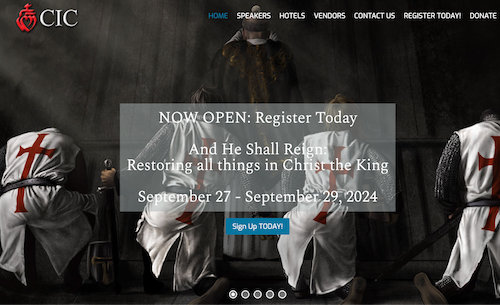 In early May, Nick Fuentes, self-avowed White supremacist and leader of the Groyper Army (White nationalist internet trolls), was welcomed back to X by Elon Musk after being booted by him in 2023 for antisemitic content. For example, Fuentes has explained on his show: “I want this country to have Catholic media, Catholic Hollywood, Catholic government. I want this to be a Catholic occupied government, not a Jewish occupied government.” One day back on X and Fuentes has picked a fight with the Anti-Defamation League and is once again being charged with antisemitism.
In early May, Nick Fuentes, self-avowed White supremacist and leader of the Groyper Army (White nationalist internet trolls), was welcomed back to X by Elon Musk after being booted by him in 2023 for antisemitic content. For example, Fuentes has explained on his show: “I want this country to have Catholic media, Catholic Hollywood, Catholic government. I want this to be a Catholic occupied government, not a Jewish occupied government.” One day back on X and Fuentes has picked a fight with the Anti-Defamation League and is once again being charged with antisemitism.
While there are certainly similarities, these three TradCaths are different in style as well as politics. Add to this the recent conversion of other influencers, like Katilin Bennett (aka the Kent State Gun Girl) and right-wing influencers who are already Catholic, like Ali Alexander of Stop the Steal, and Steve Bannon. No doubt these figures make common cause when it proves beneficial—they may endorse the same candidates and vote the same way in national elections—but to call them part of a unified “movement” might be misleading. Internal divisions and feuds are common in spaces where ideas about theological or ideological or racial purity are discussed. Which is why their numbers are so small given their outsized media presence.
So is this about the Latin Mass, or are trads just a product of social media’s algorithmic culture, finding Catholic content through a pipeline of right-wing influencers? Is it a political movement, or is it “religious”—a distinction RD contributor Daniel Miller argues is a poor analytical framework. Do we include Leftists who like traditional Latin Mass? Figures who are often lumped together by journalists, academics, and clerics alike feel very differently about the liturgy as well as doctrine. While many trads identify as Republicans, or at least Trump supporters, many reject those labels as well. Some go further into the world of the far-right, where even Steve Bannon is too “neocon,” while others embrace figures like Slavoj Žižek, the Marxist philosopher who’s recently dabbled in anti-wokeness. Recent internal divisions over the war in Gaza are but the latest examples.
But whether or not one finds “Trads” or “Christian nationalists” a useful explanatory framework for our current political moment, it’s clear where much of its rhetoric, leadership, and political momentum actually comes from: Catholic influencers who know how to use Catholic imagery and material culture to build enthusiasm and support for the kind of White Christian civilization that people across the Christian nationalist spectrum can get behind.


